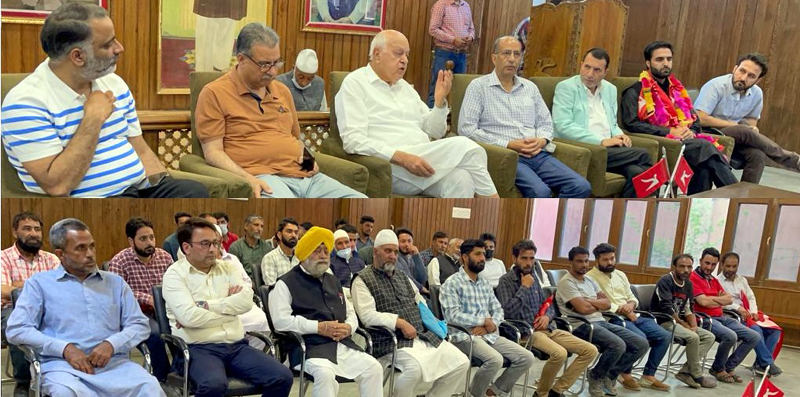Excelsior Correspondent
SRINAGAR, June 9: National Conference (NC) president and MP from Srinagar Dr Farooq Abdullah today called for ending the gap between youth and politics, saying only NC has the capability of bringing more youth into politics.
Dr Abdullah said while welcoming a prominent political youth activist Iqbal Nabi Dar from Katipora, Tangmarg into the party fold here at party headquarters Nawa-e-Subha, Srinagar. Among others party’s provincial president Nasir Aslam Wani, Salman Ali Sagar, Imran Nabi Dar, Showkat Mir, Farooq Shah and JS Azad were also present.
“A sense of choked democratic spaces and deepening insecurities in their own land remains the biggest hurdle in the growth of our youth. The persistent denial of political rights also contributed significantly to the widespread unrest, anxiety, and frustration in them,” Dr Abdullah said.
The party, he said, was actively involving youth at all decision making levels to attune party policies to their needs. “Democratically elected governments since 1996 worked day in and day out to drive out fear from our youth. We worked towards creating safe spaces for them. But it seems that the dividends brought by the efforts of successive popular governments stand liquidated today,” he added.
“Youth’s participation in politics in Kashmir is a complex story to tell, yet the party with its immense efforts and capabilities has been able to bring more youth into its ranks. Today’s joining is an effort in this direction. There is a greater need to amplify the process for a better future,” he further added.
The story of Kashmir’s youth is directly linked to broken promises, shrinking of democratic space and denial of any meaningful participation in a genuine democratic exercise, Dr Farooq said, adding that the August 5, 2019 decisions have further deepened the trust deficit between the local youth and Government.


